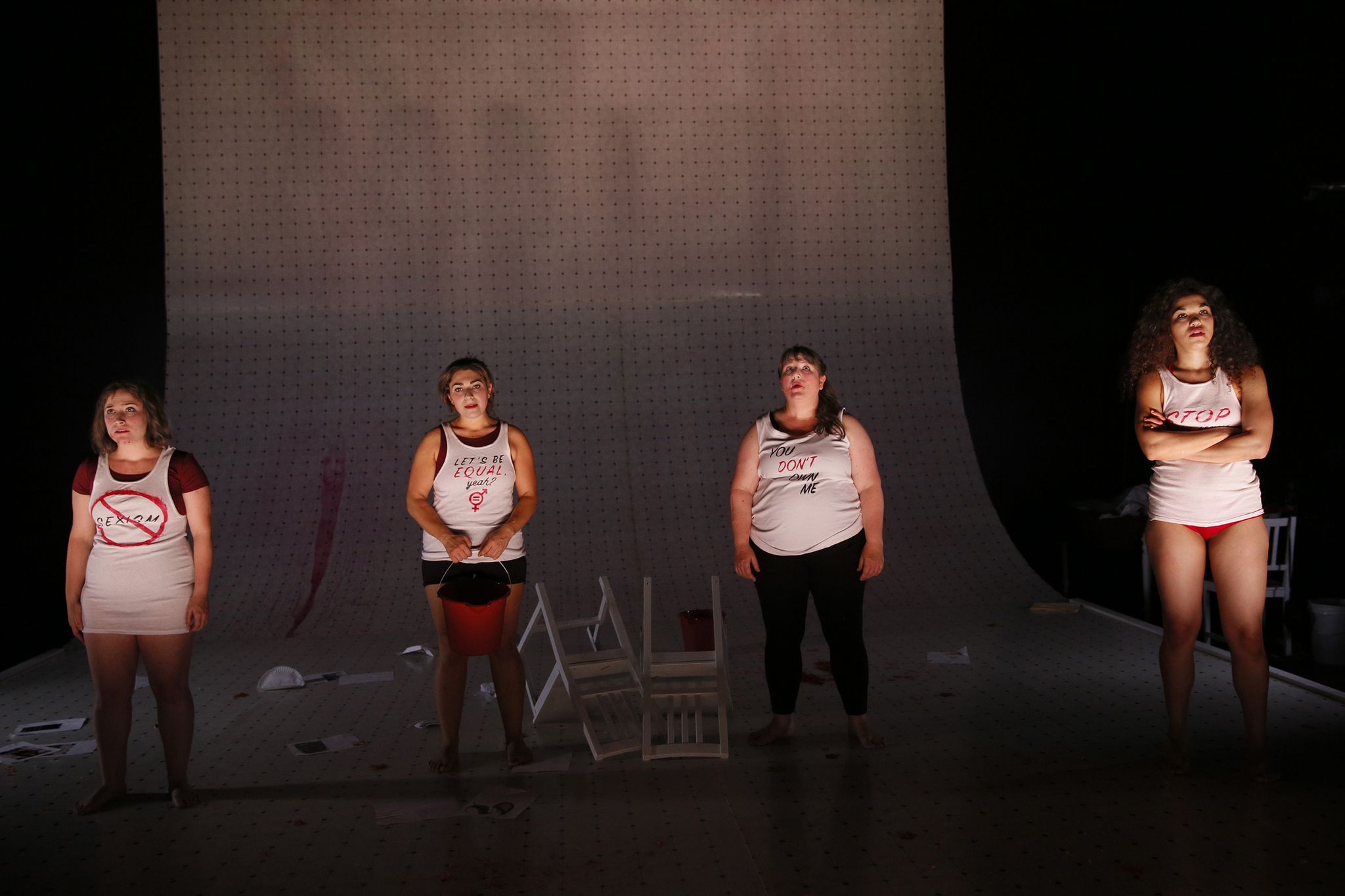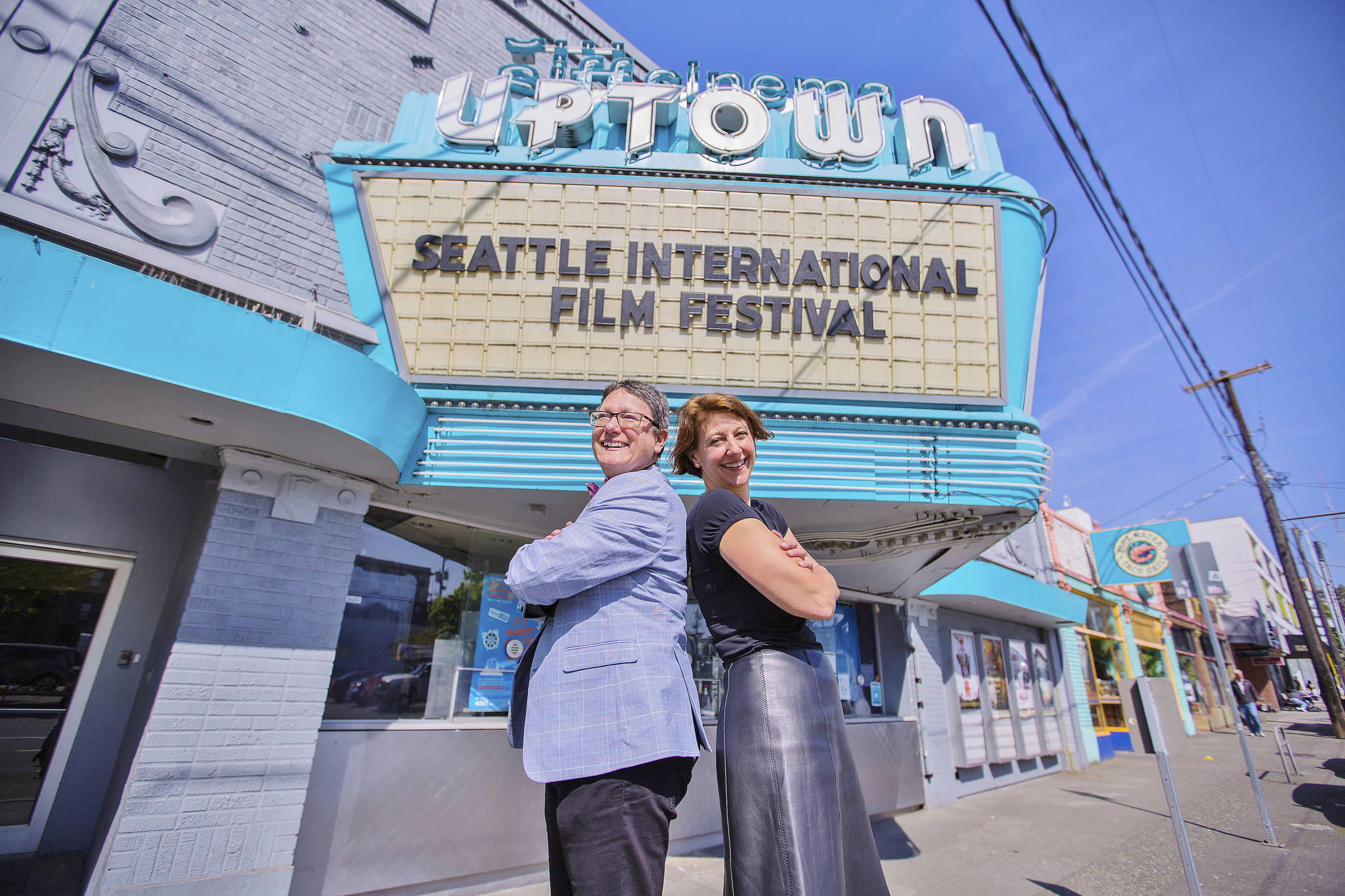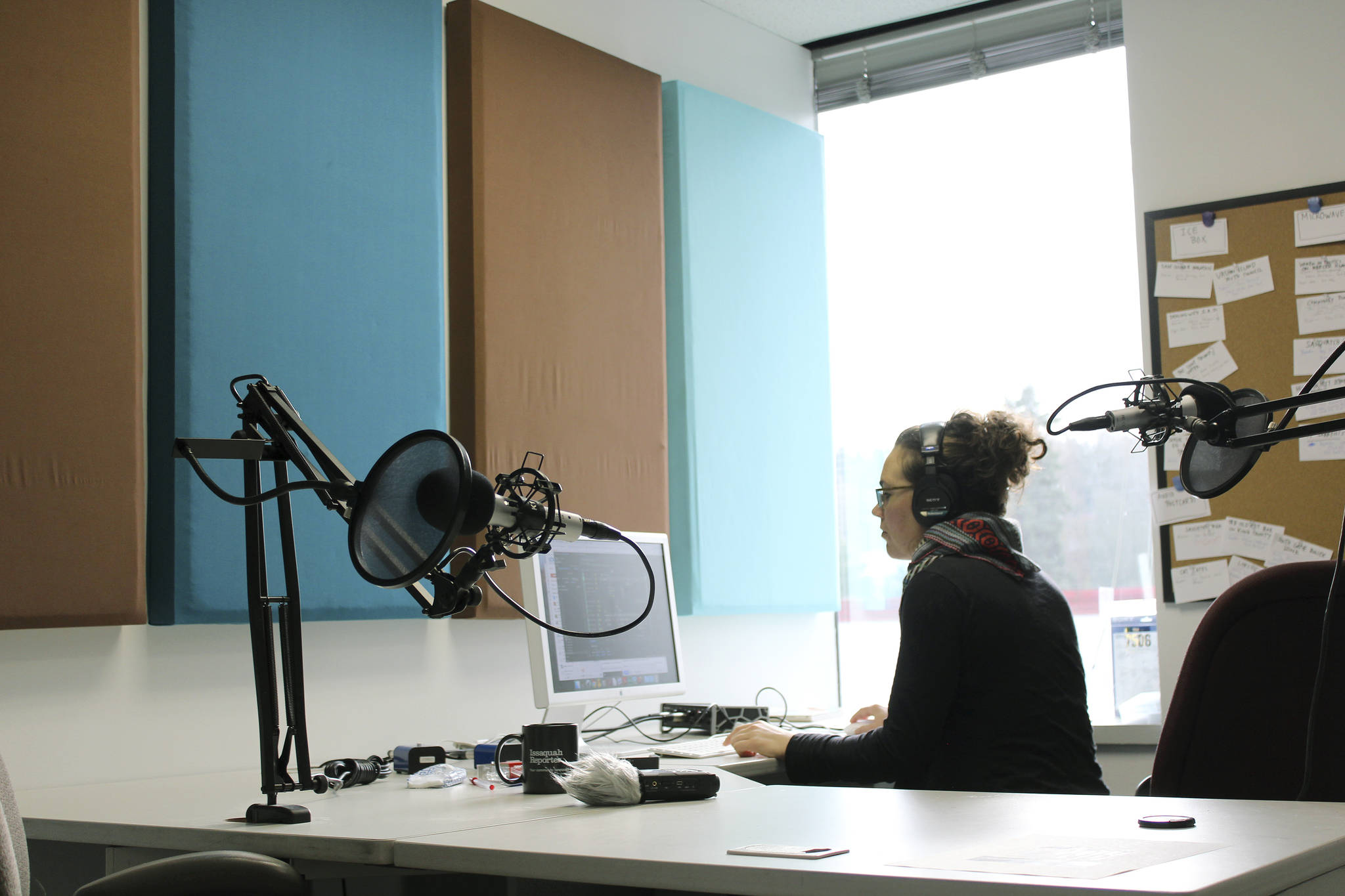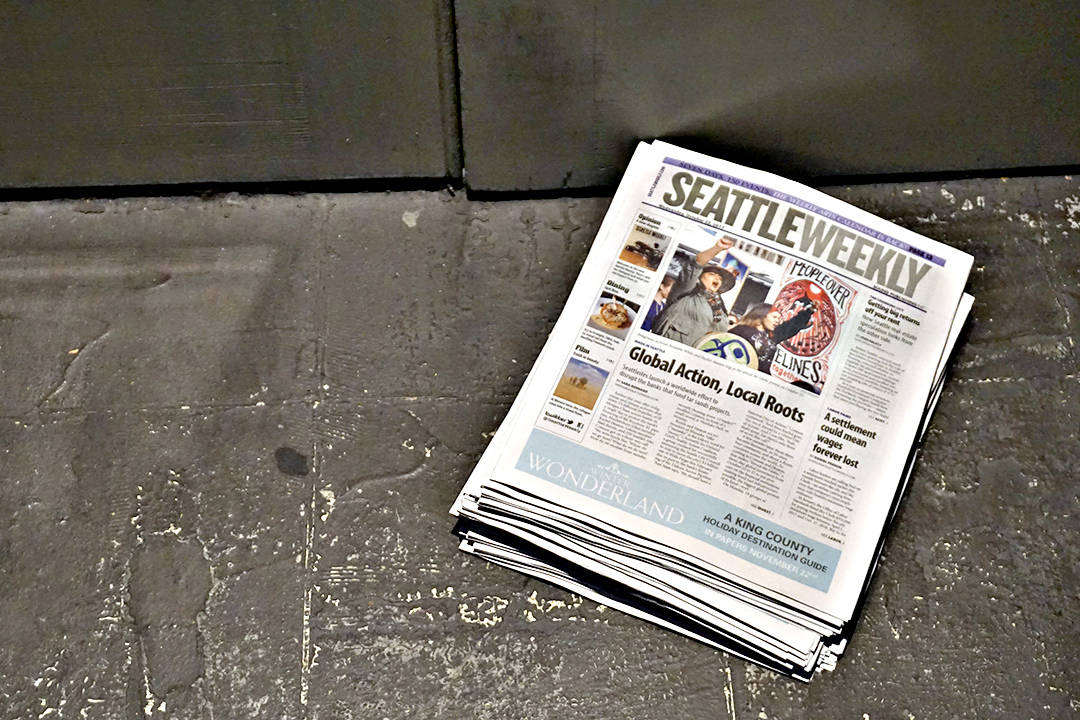The set for the current production of Ghosts at ArtsWest is cozy, but not particularly cramped. Surrounded on all four sides by the audience, the stage for this production of the Henrik Ibsen drama is a long, wide platform upon which are a few spare pieces of parlor furniture—a dining-room table, a settee, chairs. Yet in this crisp production of the devastating Norwegian classic, there is barely room to breathe. The low Scandinavian sunlight adds to the cloistered feel on this set designed by Shawn Ketchum Johnson, managing to make its way through the filthy windows to the south and west to illuminate a foggy haze that hangs over the room, as inescapable as the moral certitude engulfing the play’s world.
Fear of condemnation from the caretakers of this morality is the catalyzing force in this story, directed here by Mathew Wright. And at the center of this story is Helene Alving (Suzanne Bouchard), a wealthy widow in the process of opening an orphanage, which will double as a memorial to her late husband. As it nears completion, she is visited from Paris by her son Oswald (John Coons), a young, once-promising artist whose bohemian lifestyle is irresistible to the family maid (Sophia Franzella) but at odds with the town’s overbearing Christian orthodoxy, represented by Pastor Manders, a repressed would-be deviant played with cold precision by Noah Racey.
As is often the case in such strict cultures, none of these relationships are what they at first seem. The ties between Manders and Alving are especially fraught—there is an untoward history here—but he is unyielding in his obedience to societal norms. “In life one must rely on the views of others,” Manders says while talking Alving out of insuring the orphanage for fear that people in the community will think they have no faith that God will protect it.
In relief to this paternal idiocy is Alving’s feminism, which is disclosed early on when Manders peruses the books on her table—the titles Attacks on Marriage and Freedom of Women among them. He scoffs. “There is nothing new in any of it,” he says. “Have you read them?” she replies. “No.” “Then how do you know what you are condemning?”
This exchange shows the power of the script, adapted by Richard Eyre for a 2013 revival. It is economical—this brief conversation eats up just a quarter of the time of the original—and also direct, with those book titles, modern inventions, telegraphing a feminism that Ibsen allowed to unfold slowly, almost imperceptibly in the original. He likely would have balked at such a didactic approach, since—in the face of protests and boycotts—he maintained that the play was meant to be a slice of realism rather than a polemic. Ironically, it is likely because of Ibsen’s respect for realism that the play holds up; Alving’s inevitable revolt against her oppressors is made believable because it is covert, carried out while attempting to maintain a semblance of conformity. Nonetheless, Ghosts’ place in the Western canon is due less to its artful depiction of real life than to its politics, which rail against the stultifying moral code of 1880s Norwegian society, and this new iteration should be celebrated for making such an important work digestible in the one-act era.
The script is assisted by some memorable performances here, in particular Bouchard’s. Her Helene is a survivor of a hellish marriage, we learn, her husband an abusive philandering drunk, and the post-traumatic stress at times consumes her. “Ghosts, they don’t die,” she says at one point. “They walk the world.” The haunting is in her own mind, indicated by the production’s subtle sound design by Wills and deft lighting by Alyssa Milione. But where the madness is truly made manifest is in Helene’s face, which Bouchard manages to contort on cue into a quiet, twisted rage, her left eyeball seeming to bulge at every asinine demand the world makes of her.
It is this powerful production’s most heroic performance, one that requires a dexterity of emotion that can flash from sorrow to anger to love in the time it takes to say “The orphanage is on fire!”
There is nothing covert about the series of revolutions at play in Washington Ensemble Theatre’s production of Alice Birch’s Revolt. She Said. Revolt Again. They are literally written on the wall in this exquisitely distressing piece of protest theater.
The fact that such a production exists speaks to the clear evolution of theater and, perhaps less so, the wider world in the past 130 years. One needs only to read about the incredible resistance Ibsen met after publishing works that questioned the convention of marriage to recognize that we have moved a long way toward recognizing women’s autonomy. And yet, as this 70-minute exploration of modern feminism makes abundantly clear, the pall of sexism remains with us today, and the crush of conformity is perhaps even more maddening than it was in Helene Alving’s world.
That sounds heavy, but Revolt is surprisingly light on its feet. Directed by Bobbin Ramsey, the play moves through a number of scenes—plus one tantalizing lip-sync performance of “Single Ladies”—with some buoyancy and a goodly amount of humor thanks to Birch’s script, which manages to deliver wit, punch, and decay in equal measure. Yet the levity only makes the let-downs that much more devastating.
There is no traditional story here. Rather, the production is divided into a series of seemingly unrelated vignettes connected only by a common framing device. As each scene begins, a directive is projected onto the wall behind the actors, each followed by a specifying parenthetical. “Revolutionize the Work,” reads one. “Revolutionize the World,” another. The entire production reads as a performed feminist manifesto.
“Revolutionize the Language,” reads the first directive, “(Invert it.)” As those words hover above, a scene unfolds below, a two-hander in which a woman (Ayo Tushinde) and a man (Joe Cummings), home from a night out, begin a familiar dance of seduction with some semantic tensions. As the scene plays out, the directive finds purchase when the woman flips the script on her lover, coaxing him into being the submissive, shifting from coy wordplay into unconventional foreplay. “I’m going to take my vagina and … ” she says before her partner protests: “You cannot take your vagina. You cannot take a gap!”
It’s a heartbreaking moment in an otherwise playful scene that is driven by convincing onstage chemistry. It doesn’t stop the scene—the woman ends up “wrenching” her date—but these sexist jabs do continue to show up again and again throughout the show. They do not drive the action; they are rarely even commented on. They are simply constant irritants that occur whenever the men—essentially cast as clowns here—take the stage, including a transcendent piece of comedy in which a worker (Alyssa Bostwick) attempts to convince her boss (Arjun Pande) to give her Mondays off.
When men aren’t onstage—as in one particularly moving scene featuring a couple arguing about marriage (Anna Kasabyan and Samie Spring Detzer)—the comedy is less broad, the politics more complicated, and the pathos more accessible, revealing a deep well of anxiety and anger. But solutions are not as readily available as are the directives projected overhead.
By the play’s penultimate scene—a most unconventional family dinner—the directives are piling up and nearly impossible to keep up with. The demands of feminism collude with the pressures of the patriarchy to render anyone who is paying attention—and it is impossible not to pay attention to this remarkable work—exhausted. Ghosts, ArtsWest, 4711 California Ave. S.W., 938-0963, artswest.org. $37.50. Ends Oct. 16. Revolt. She Said. Revolt Again., 12th Avenue Arts, 620 12th Ave., washingtonensemble.org. $25. Ends Oct. 10.
mbaumgarten@seattleweekly.com








